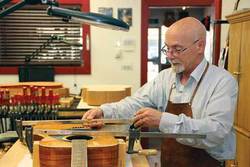Pipestone Flyer
The $5000 - $6000 you pay for a handcrafted guitar made in Warren’s Music in Wetaskiwin may be made from the leaf of a table bought in Variety Village. Or wood salvaged from a 100 year old piano. But it is wood that is especially good because it was likely aged 50 years before it was made into a piano. Other parts might be crafted from a raw chunk of ebony that had been dropped off at the shop and then carefully analyzed to maximize the use of every cubic centimeter. The meter long prized piece of the densest wood on the earth that came from Africa, snakewood board, will be precisely cut used for guitar parts. Two pieces of spruce are carefully selected, meticulously analyzed, glued together and finally tested with a bright light in a darkened room to ensure the seam has absolutely no holes. Two pieces are used knowing one solid piece will have more of a tendency to crack. The tiny knot hole in one of the otherwise great pieces of spruce will be strategically placed as part of the sound hole when designing the body of the guitar.
This is what happens in the back room of Warren's Music located across from the Library in Wetaskiwin where Warren Fairhurst designs and builds 2-3 hand-crafted guitars every 3 months.
Warren sells instruments, fixes instruments, builds instruments, reclaims instruments and teaches music lessons. As he points to a badly damaged guitar, one of many in-the-works projects, he suggests, “I took on this project as more of a challenge than to make any money. It (the badly damaged guitar) was involved in a rollover and covered with stickers but was a fine piece so I took it on.” The body of the guitar is covered in colored patches where Warren has removed stickers before beginning restoration of the body.
Warren Fairhurst’s passion for fixing and building string instruments began as a 10 year old youngster in Montreal, Quebec where he bought, fixed and sold guitars to earn spending money. “Of course we didn’t have much money back then so I would buy guitars that were broken and fix them. Eventually someone would like what I had and buy it, and I would get another one. I just learned through experience how to repair these things properly and make them work and set them up so they play well.”
“I don’t have formal training in music, just my years of being around it.” He began sharing his passion and knowledge for music with others by offering music lessons several years ago. Today, he is teaching “guitar, some mandolin and a little bass” lessons to more than 40 students.
Warren’s Music opened its doors in May to fill a need in the community. “I was teaching and what I found is kids were coming in with guitars in a terrible state so I was either fixing their guitars or getting them instruments that were playable.”
Warren’s Music also sells manufactured instruments but, “There is a big difference between a handmade guitar and a manufactured guitar created with a machine that is computer programmed to cut every piece consistently the same. Every guitar I make is unique. When we build a guitar we start out by just putting these cross braces (inside the body of the guitar) and then each piece is sculpted to get that nice long bell sounding response. The body of the guitar becomes a speaker. The type of material I use has everything to do with the quality of the sound.”
Warren uses hardwood such as rosewood for the backs and sides to resonate the sound and a soft wood such as spruce for the top to allow the vibrations to penetrate into the sound cavity. He goes on to explain other differences found in his hand crafted guitars such as using bone instead of plastic for the saddle. This is the piece the strings are pressed against on the bridge of the guitar and because plastic saddles are softer they can weaken the sound produced by the strings. Using hard wood for the neck is also important so it doesn’t absorb the sound of the strings before it gets to the body. The type of strings must be compatible with the musician as well as the construction and type of material used to build the instrument. The wrong strings “can break an instrument”.
“People choose my hand crafted guitars for a variety of reasons; someone who wants the finest to someone who wants a unique instrument. No, two are the same.” Prices start at $3200 and one built using the best possible material Warren has available will climb to $5200+. He also sells a variety of manufactured instruments in the $200-$600 range, “but I won’t sell anything I can’t stand behind for quality”.
As he proudly gazes around at the shiny, new violins, guitars, mandolins and banjos in his shop, he pulls an old badly damaged mandolin out of a faded and beat-up canvas case and declares,” This instrument originated in Europe likely centuries ago. I will restore it and eventually I will figure out who the builder was and where it came from.”
For more information contact Warren’s Music at 780 352 0044.